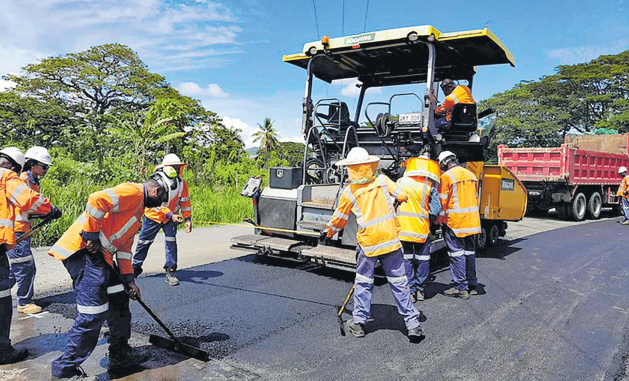YEARS of wear and tear, heavy traffic and patchwork repairs have left the Nasinu-Nausori corridor in rough shape, but the authorities say a co-ordinated push is now underway to rebuild key routes like Wainibuku Rd to Delaidogo and restore public confidence in Fiji’s road network.
The Fiji Roads Authority (FRA), which oversees one of the country’s busiest transport corridors, has been tasked with fast-tracking maintenance and upgrades after years of underinvestment, poor drainage and mounting congestion that have taken a heavy toll on residents, businesses and motorists alike.
Responding to a question from Opposition MP Jone Usamate in Parliament, Public Works, Meteorological Services and Transport Minister Ro Filipe Tuisawau said the ministry was committed to improving the condition of key transport routes across the Central Division, where population growth and heavy traffic have placed mounting pressure on road networks.
“The infrastructure currently consists of more than 6360 kilometres of road, 188 bridges, 21 jetties, 10 landings and about 9000 streetlights,” Mr Tuisawau said.
“Our focus is to ensure the maintenance, upgrading and resilience of this critical network, while also improving safety and service standards.”
He said the authority had been directed to strengthen operational efficiency, ensure quality control, and support contractors through training and monitoring.
“The authority must ensure that maintenance and upgrading of roads, streetlights, footpaths and drainage alleviate complaints from road users.
“We are also improving asset evaluation systems to ensure assessments are carried out regularly.”
The minister said the FRA was working with relevant ministries to relocate residents who had settled on land earmarked for road projects, which often caused delays in implementation.
“Collaboration between the FRA and the Ministry of Public Works must be strengthened.”
Concerns from the Opposition
Opposition MP Jone Usamate, who raised the initial question, told Parliament that poor road conditions had become one of the country’s most persistent public frustrations.
“This debate is not just about a report,” he said.
“It is about the everyday struggles of people, the wasted hours in traffic, the damaged cars, and the frustration of seeing potholes fixed today and back next week.”
He said the authority’s consolidated report for 2019 to 2021 painted a worrying picture of a road network failing to keep up with the needs of the population.
“When there are not enough qualified people to design, monitor or inspect roadworks, it is the people that suffers.
“We see roads built without proper drainage, potholes appearing within months, and bridges taking years to complete.”
Mr Usamate said the authority’s challenges were compounded by a shortage of engineers and technical officers, an issue the Standing Committee on Social Affairs also identified.
“The committee found that the FRA took back many key functions after the termination of its management contract with MWH in 2016, but instead of improving services, it is now overburdened.
“The FRA must move from short-term fixes to long-term planning.”
Road humps and poor co-ordination
The Opposition also criticised the lack of national standards for road humps, which it said had become a source of widespread complaints.
“One of the biggest complaints from people today is the inconsistent and oversized road humps appearing all over Fiji,” Mr Usamate said.
“Some are so high they scrape the bottom of vehicles; others are placed where there is no need.”
He called for a national standard to regulate the height, width and placement of road humps and to ensure proper signage for speed control zones.
“This is not a small issue,” he said.
“It affects every driver, every day. The FRA’s job is to make our roads safer, not turn them into obstacle courses.”
Mr Usamate also noted poor co-ordination between the FRA and municipal councils, leading to confusion over who was responsible for maintaining roads, streetlights and drainage.
“Residents are left in dark streets, flooded drains and broken footpaths while one agency says it is not their responsibility and the other says it is under the FRA.
“People do not care which department is responsible, they just want the work done.”
He said the Government must invest in training engineers and technical workers to reduce reliance on foreign consultants and build lasting capacity.
Minister acknowledges challenges
In his response, Mr Tuisawau said the Government recognised these concerns and was already implementing measures to address them.
He said the FRA was now improving internal processes to ensure contractors met performance standards and that projects were better monitored.
“We acknowledge that there are challenges with manpower and technical expertise, but these are being addressed through ongoing recruitment and capacity-building initiatives.”
Mr Tuisawau also acknowledged the need for stricter quality assurance on roadworks.
He said some of the issues raised, such as uneven road surfaces and inadequate drainage, stemmed from past practices and the lack of consistent oversight.
“Government is now working closely with our development partners to improve engineering standards and strengthen quality control.”
Public expectations
The minister said improving road conditions would not happen overnight, but the Government was determined to deliver lasting results.
“Road maintenance is continuous work. It requires not only funding, but also planning, capacity and time.
“We are ensuring the FRA and its partners deliver value for money, with work that meets proper engineering standards.”
Mr Tuisawau said the ministry was reviewing long-term road maintenance plans to focus on durability rather than patchwork repairs.
He said the Government’s infrastructure program was guided by national development priorities and international best practice.
“Our people deserve reliable roads, safe bridges and well-lit streets.
“This government remains committed to ensuring every Fijian, whether in Nasinu, Nausori or the most rural areas, has access to safe, quality infrastructure that supports daily life and economic opportunity.”



